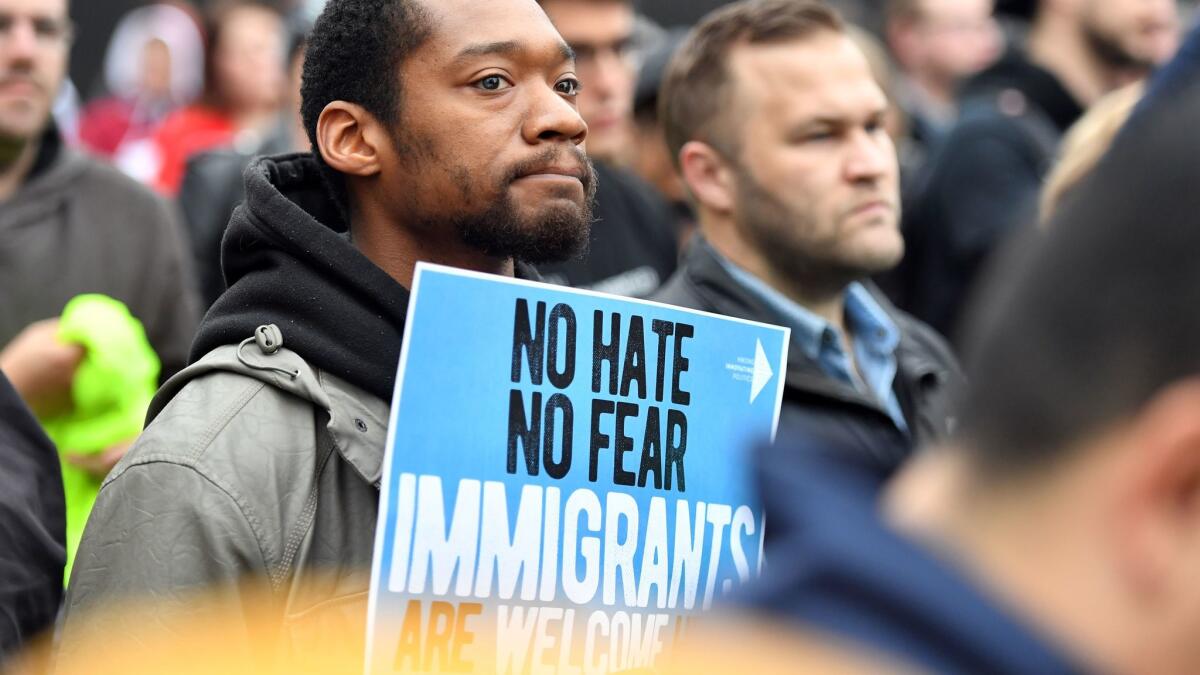Some of the California ‘sanctuary’ laws targeted by feds could be vulnerable, legal experts say

- Share via
Reporting from San Francisco — California’s three new “sanctuary” laws, challenged in court this week by the Trump administration, face different hurdles and have varying vulnerabilities, legal experts said Wednesday.
Law professors who read the lawsuit filed by Atty. Gen. Jeff Sessions generally described it as a credible challenge that presents complex legal questions that might wind up before the U.S. Supreme Court.
“The arguments made by the Justice Department are not at all lightweight arguments,” said Pepperdine law school professor Douglas W. Kmiec. “They are quite substantial.”
The federal government has wide authority over matters of immigration, and Sessions has charged that California’s new laws usurp or preempt federal rules.
The supremacy clause of the U.S. Constitution says federal law takes precedence over state laws, and Sessions’ suit accuses California’s new regulations of violating that provision.
Most analysts said they expected California would prevail in defending a law that prohibits state and local law enforcement from voluntarily giving federal immigration authorities information about the release dates of immigrant inmates.
Federal district judges have decided in favor of cities with ordinances that limit law enforcement’s cooperation with immigration agents, and the Supreme Court has ruled that the federal government may not commandeer states into becoming the enforcement agents of federal law.
In 1997, for example, the Supreme Court said a federal law requiring state and local governments to do background checks before issuing permits for firearms violated the 10th Amendment.
“The state is trying to say, we are only going to cooperate with the federal government to the extent required by federal law,” said UC Davis law school Dean Kevin R. Johnson.
California acknowledges that “the federal government is in charge of immigration, and we have to cooperate,” Johnson said, “ but we don’t have to go one inch further.”
Loyola law professor Kathleen Kim said the purpose of sanctuary laws was to ensure that immigrants report crimes and cooperate with law enforcement without fear of being deported.
“The cities and the state have a right under the 10th Amendment to pass what they deem necessary to advance public safety for California residents,” she said.
UCLA law professor Hiroshi Motomura said the Trump administration was “attacking California laws that do nothing more than require immigration enforcement to respect the U.S. Constitution.”
This was settled 200 years ago. States don’t get to do that.
— Chapman law professor John Eastman, saying a state law on inspecting detainees’ records amounts to “supervising the federal government”
But analysts were less certain about the prospects of another state law that makes private employers liable for voluntarily cooperating with immigration authorities.
That law requires private employers to give workers 72 hours’ notice before inspections by immigration authorities.
“A state can’t act in a way that impedes the achievement of a federal objective,” UC Berkeley law school Dean Erwin Chemerinsky said.
The state could counter that it was simply regulating business to protect citizens, he said.
“It’s a difficult question under current law, and a lot depends on the judge’s perspective,” Chemerinsky said.
Legal analysts generally agreed that the regulation involving private employers was the most vulnerable of the laws Sessions challenged.
“Whenever the federal government is seeking to impose obligations or duties on state and local officers, as opposed to private citizens, the state will have a better chance of succeeding,” Kmiec said.
Also potentially vulnerable is a law that requires the state to inspect non-criminal immigration detainees being held in state, local and private facilities, analysts said.
Chapman University law professor John Eastman said that law creates “a clear conflict with federal law” by giving the state the right to inspect detainees’ records.
That amounts to “supervising the federal government,” Eastman said. “This was settled 200 years ago. States don’t get to do that.”
Others said that California has the right to inspect detainees in state, local and private prisons and can argue that the law was necessary to ensure safe and humane conditions.
Johnson noted that the new state laws were “pretty carefully crafted” and contained caveats that the rules were not to interfere with federal requirements.
“If there is a conflict between the laws, then federal law is going to prevail,” Johnson said.
Kmiec said the federal government “will try to throw its weight around.”
“They have substantial authority, given the foreign affairs aspect of immigration,” he said, “but the state is not without its arguments.”
The federal government has sued states in the past.
The Obama administration in 2010 challenged an Arizona law that made it a crime for an immigrant living in the U.S. illegally to search for a job and required immigrants to carry documentation with them at all times.
The Obama administration argued that Arizona was usurping the U.S. government’s sole right to make immigration law. The U.S. Supreme Court struck down most of Arizona’s law.
Sessions filed the lawsuit in a federal court in Sacramento, a more conservative district than those in San Francisco and Los Angeles. But the district court’s rulings will likely be appealed to the U.S. 9th Circuit Court of Appeals, which has a majority of judges appointed by Democrats.
Johnson said Sessions probably chose to file in Sacramento for political, not legal, reasons.
“It seems to me that this is all kind of a political show,” the UC Davis law school dean said. “Jeff Sessions is going to Sacramento talking about open borders…. It is more a political statement.”
Twitter: @mauradolan
More to Read
Sign up for Essential California
The most important California stories and recommendations in your inbox every morning.
You may occasionally receive promotional content from the Los Angeles Times.











